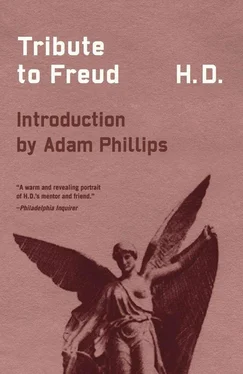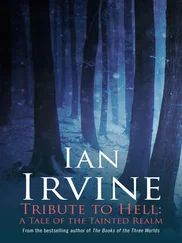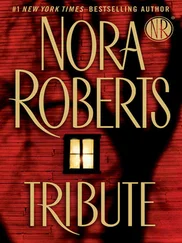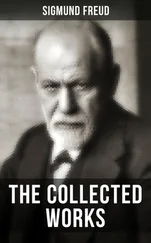March 20, Monday
I spent a happy Sunday at the galleries; I found Tiziano Vec., Jacopa da Strada, 1477–1576, and Palma Gioime, 1544–1628, with statues. . and Giov. Batt. Moroni, 1520–1578. One of the paintings of a fine, intellectually weathered renaissance Italian, standing by a table, with small statues, suggested to me the portrait of Sigmund Freud with his row of little images before him on the table.
6:40 P.M.
I went up to Mrs. Burlingham’s apartment at 4:20. She was quiet, slim, and pretty in her art-craft simple consulting room or sitting room that Freud’s architect son had decorated for her. Like the Professor, she had a few Greek treasures. Her little grey Bedlingham scurried under the couch but crawled out later to make friends with me. I met her daughter, my own child’s age, and a boy of seventeen. Another child was having a music lesson in the next room. I was a little disconcerted by Mrs. Burlingham’s reserved, shy manner, and her reminding me that I was due at five, downstairs with the Professor.
Then down to Freud. . I told him of the visit. Then I felt a little lost. Perhaps that was partly because of the dream I had last had. I tried desperately to get back to my flat in Sloane Street, London. The flat is at the top of the house. As I enter the downstairs hall, a man and then a rough boy barred my way to the staircase and seemed to threaten me. I did not dare challenge them. . (I could not tell the Professor that this terror was associated in my mind with news of fresh Nazi atrocities.) As I stood threatened and terrified I call, loudly, “Mother.” I am out on the pavement now. I look up at the window of my flat. It has different curtains or a suggestion of Venetian blinds. A figure is standing there, holding a lighted candle. It is my mother.
I was overpowered with happiness and all trace of terror
vanished.
8:20 P.M.
We talked of Crete. I told him how disappointed I was on the cruise last spring. It was too rough to land. There were dolphins playing about the boat, anchored off the rocky shore; there was a permanent rainbow from the sea spray. We saw the chapel high on the slopes where it was reputed Zeus had been born, or nursed. We spoke of Sir Arthur Evans and his work there. The Professor said that we two met in our love of antiquity. He said his little statues and images helped stabilize the evanescent idea, or keep it from escaping altogether. I asked if he had a Cretan serpent-goddess. He said, “No.” I said that I had known people in London who had had some connection with Crete at one time, and that I might move heaven and earth, and get him a serpent-goddess. He said, “I doubt if even you could do that.”
The Professor speaks of the mother-layer of fixation being the same in girls and boys, but the girl usually transfers her affection or (if it happens) her fixation to her father. Not always. The Crete mother-goddess is associated with the boy or youth in the wall-painting of the crocus fields. We talk of Aegina too. The Professor went on about the growth of psychoanalysis and how mistakes were made in the beginning, as it was not sufficiently understood that the girl did not invariably transfer her emotions to her father.
He asked, “Was your father a little cold, a little stiff?” I explained again that he was what is known as “typically New England,” though he was one remove from New England, his father having moved to the west. The Professor said he thought my dance-dramas at Corfu were really a sort of display or entertainment for my mother. Did your mother sing to you? I said she had a resonant beautiful voice but that she had some sort of block or repression about singing. Our grandmother loved me to sing to her, old-fashioned hymns for the most part. My older brother and I sang little nursery songs to our mother’s accompaniment. The Professor said this held together. “It will simplify out, even more.” I told him again that my mother died in spring, at this very time, and again I remember that Lawrence died too, in March.
March 21, Tuesday
The beautiful engraving that I have of the Professor is propped up on my dressing table. It becomes the “answerer,” like the particular Osiris-image that he showed me.
6:30 P.M.
The Professor was touched with Bryher’s note and her gift to the Society. We talked of the political situation.
There are no frontiers of the spirit.
Yet I am torn by intense emotions of antipathy.
Last night, I had my old train-nightmare. I am going somewhere vaguely undefined with my daughter and Alice, who was at one time her governess. A uniformed official searches our bags. He finds my traveling-flask. Cognac? I attempt no explanation nor apology. The official (“censor,” the Professor?) finds another bottle hidden under the seat. There are more bottles. He collects the lot in an empty suitcase and orders us to follow him.
My daughter and Alice and I are lost somewhere, on some dangerous way, down some steps.
The Professor asked me my association; I said I had no precise association, I was just afraid of being found out. He said, “Maybe, some scruple.” Conscience?
There are so many associations with trains. I recall one in particular when I arrived on the boat train, just after dawn in Paris. My French coffee and rolls at the station buffet were indescribably France. Again, I had got away. Loving England, there was yet, always, that almost hysterical sense of escape, once across the channel. I could even recall the wall-paintings of the Gare — du Nord? Normandy with apple trees, a sea wall and blue sky broken by a foreground of — olives? orange trees? While I was having my coffee in the almost empty buffet, a boy arrived with a huge market basket piled with roses. The manager or waiter selected a handful of roses and laid them by my plate.
Then I remember an incident that preceded the train dream. I am being fitted for a green gown. I stand before a mirror and extend my foot. I wear a beautifully cut classic, yet suitably modern, Greek sandal.
The Professor said, “You tell it so beautifully.”
Before I leave, I fold the silver-grey rug. I have been caterpillar, worm, snug in the chrysalis.
The Professor touches the little bell to warn the maid that this last analysand is about to leave. His elbow concludes its bird-wing dismissing gesture. The Professor says, “We have gone into deep matters.”
They called my father the Professor and my half-brother the young Professor. Our Professor was right, they do not resemble this Viennese Herr Professor Sigmund Freud. He is nearer to the grandfather and that religion, “an atmosphere. . ”
They were North-of-England people. We children were the ninth generation to inherit a quaint English name. Six generations were weathered and shaped by the rock and flint of New England. Our father’s father, the seventh, was lured with that covered wagon generation to the west. His young wife was not happy. They intended to get to California but they settled in Indiana. They began all over again, where the first Puritans of their name had started.
There were still a few Indians in the district. Our grandfather had his law books. Our father helped in the fields but he found plowing difficult. His idea of a straight line was more abstract; he had his father’s Euclid.
They were hunting runaway slaves. Our young father missed the “surge and thunder” of the New England odyssey. He looked to the heavens; mariners steer ships by stars.
He worked with lathe and saw, he was apprenticed to a carpenter. He learned his trade; his thin fingers had a “feel” for pine, tulip-tree, and cedar. His sister Rosa appropriated the Virgil and translated for him. He did not know what he wanted when he picked out, with his far-sighted grey eyes, the ten stars of the Dipper or the eight of Orion’s sword-belt. But he knew this satisfied him. He found Algol.
Читать дальше











